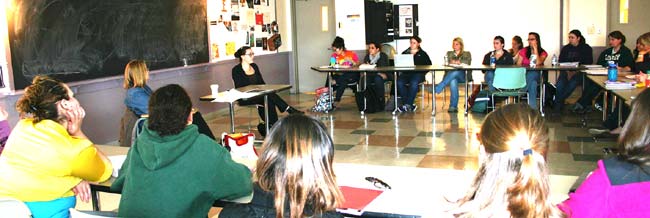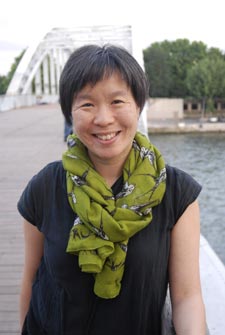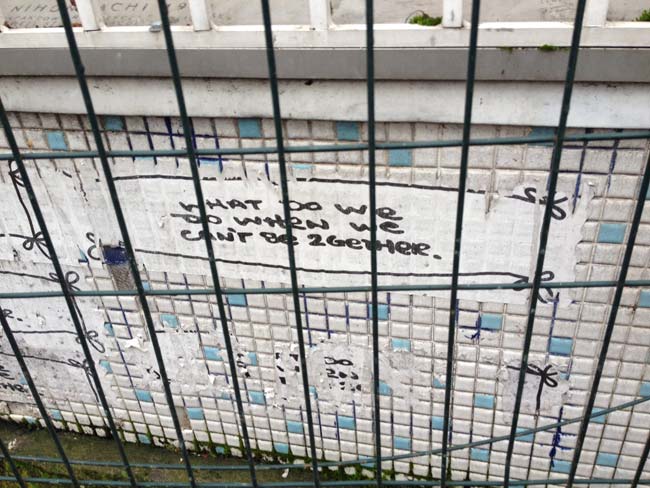From Oscar of Between, Part 20B
by
Betsy Warland
Summer, 2012. Oscar. In Edmonton. At the Precarious Theorizing Symposium at the University of Alberta: an idea/emotion-infused gathering to honour and continue the thinking of Dr. Sharon Rosenberg who died two years prior. Sharon had sought out Oscar as an editorial consultant for her increasingly unconventional scholarly writing not long before she was diagnosed. Two of Sharon’s central concerns were “traumatic ignorance” and “memorialization of violent deaths.”
Oscar, preparing for the conference, fails (once again) to turn down the volume before the CBC’s top story begins: “Seventy-two people have been shot while attending the new Batman movie – twelve are already confirmed dead. The shooter is an unidentified young man who wore combat gear.”
Oscar. Stopped. In. Her. Tracks.
A few days later, Oscar decides to conclude her keynote with a reading from Oscar of Between, Part 18.
No one stirs after she finishes.
It is utterly silent.
Oscar, still looking down, gathers herself. Sighs. Looks up at their faces.
“I feel an urge to apologize but I am not going to. I know that was hard to hear but we are living in troubling times. Very troubling times.”
A tender clapping falls on them all like much-needed rain.
The next day at the final presentations, two women scholars of German origin comment on their struggles with WWII.
One of the women reflects: “How could it be that amidst all of our theorizing what we weren’t doing … was … talking about our own transgenerational hauntings?”
The other woman says that the possibility, even assumption, of being implicated leaves her feeling frustrated and hopeless: “Where can you go with that?”
Oscar agrees that “implicated” and “complicit” have accuracy but that they also stall us in various forms of reactivity.
She searches for another word.
Then it surfaces:“Disassociation.This is what deeply concerns me – its deadly toll on us all.”

Photo credit: Daphne Strassmann

Photo credit: Edward Parker
Guest Writer:
Larissa Lai
Calgary, Alberta
Larissa Lai’s Web site
Fall, 2012. Haamyue. In her UBC classroom, teaching a fourth-year Canadian Literature class, entitled “Race, Memory, Citizenship.” This course, and its required nature, a consequence of so many layers of affirmative action. What we thought we were fighting for. In retrospect, it is a course on second-generation trauma narratives and the problem of postmemory.
“The second generation is the hinge generation in which received, transferred knowledge of events is being transmuted into history, or into myth. It is also the generation in which we can think about certain questions arising from the Shoah with a sense of living connection.” (Eva Hoffman via Marianne Hirsch)
I know about this already. I’ve been to the Museum of Anthropology.
The question is what would you rather?
When your generation is dead, racism will be over.
They already made us listen to a Native elder in high school.
Oh my goodness, there is a whole field of study about questions of race?
[Weeping] I never thought of myself as racist.
It’s a dirty topic.
At the back of the class, a young white man in a cowboy hat. Sullen eyes. Quiet. One day he’s waiting for her. Haamyue, terrified.
“Professor, I’m struggling with the class. I don’t understand what is expected of me.”
“Would you like to come to my office and talk?”
“I don’t understand what this book is about.”
“Well, it’s about a group of friends growing up in Toronto.”
“I’ve never lived in the city before.”
“Do you identify with any of the characters?”
“Not really, no.”
“Hm.”
“Maybe Oku. Kind of.”
Slow amble chat nerves nerves fright. A shimmer. Scare turn stare. A glimmer. Trust?
Haamyue’s small rewards.
Haamyue’s body is wanted. Not like that. To represent, on institutional committees. Haamyue’s speech– more often than not perceived as angry, regardless of her own feelings in the moment.
and those that are not.”
a girl runs through a field of wildflowers long hair streaming behind
re mem hum man might? right. hum moo hum you hum us? oh earth rot
root rotor rudder round re rum re drum
ho hum
mem?
brrrrrrrrrrrrrrrrrrrrrrrr

Photo credit: Larissa Lai

Photo Credit: Kevin Ricks
Featured Reader:
Joan B Flood
Vancouver, BC
Joan B Flood’s Web site
I read Oscar’s Salon because
Reading Oscar provokes me to think and rethink writing and what it means to be a transgressive woman. In short, it stretches how I think and live.
Profile
Joan B Flood was born in Ireland and lived briefly in France and England before settling in Canada. Her writing has appeared in anthologies in Canada, the US and Australia. Her YA novel New Girl was published in October 2012. She recently finished a novel for adults, Left Unsaid a story of families and secrets that reverberate through two generations. She is at work on a new story, which she’s not ready to talk about yet.




Something inci(sigh)ting is happening in this month’s salon, something that rarely surfaces in published narratives: teachers giving a glimpse of the risks they take in the classroom.
There are numerous professional and personal vulnerabilities that dissuade a teacher from revealing the encounters that grip her and her student(s) by the throat. These stories seem to never see the light of the page.
In the academy or a school, there are narratives and narrative positions allowed—given status—ones not allowed. In her piece, Larissa has peeled that “not allowed” back and Oscar’s grateful. What about you?
..’transgenerational haunting…’ ‘I don’t understand what’s expected of me…”
Such a poignant juxtaposition of thought, feelings. Such searching, confusion. It lives within us all, sharp as broken glass. Where are the words to capture it? No ‘it’ exists, no singularity of ‘it’, rather a complex web.
Betsy and Larissa bring alive shock of recognition: how large the problem of various violence is within our world, our lives, and how small, painful and necessary it is to do what we can to stem it. Sometimes it is as simple as giving it a name, as complex as rising against it as a nation. And always, before, during and after is this:
“…transgererational haunting…” “ I don’t understand what’s expected of me…”
“In the academy or a school, there are narratives and narrative positions allowed—given status—ones not allowed.”
In this month’s salon, I am reminded that while education is revered in our society, it is also a privileged system and one where these models are reinforced and also sometimes deterred by political and corporate pressures. I am reminded also of the professor who can make racist comments about Vancouver’s Asian population but then be protected by the university for academic freedom. Then, on the other hand, the education system is pivotal in changing thought and understanding what historical forces shaped today and if they are relevant.
“In the academy or a school, there are narratives and narrative positions allowed—given status—ones not allowed.” An important statement. Thanks Larissa and Oscar for your writing on this topic. People often assume that universities are places of inclusive academic freedom but as Lindsay says here the kind of speech that gets protected can be speech that silences other voices. Also, professors who receive more protection for their speech are most often ones in tenure track jobs. People from marginalized social groups, with more challenging perspectives/speech, face more obstacles in getting these jobs and are typically relegated to the sessional/adjunct teaching track with low pay and poor treatment. I have a poem about this which I would like to share here:
The Adjunct Professor
The adjunct professor receives a mass email
with an attached spreadsheet
of the teaching schedule for the next year.
After seven years of teaching,
she has been dropped.
She finds herself in a university dumpster
with skeletons of older adjuncts
who collapsed on their last day
and freshly discarded guest speakers
from marginalized populations,
lured with hundred dollar honorariums
to talk for an hour about their sufferings,
violence against their kind,
to classes in social sciences.
They fight over pristine leftovers
from a conference buffet,
stuff their mouths with asparagus ham rolls
and roast beef and cheddar pinwheels
to eat later for dinner and breakfast.
They come out wearing
barely worn designer clothing
with bags of flowers, fruit and vegetables,
half-full wine bottles and almost full circles of brie.
Some tenured professors express pity
toward the adjunct professor,
ask her how she will survive.
She laughs loudly at the ignorance
of uninterrupted wealth,
recalling all the poverty
she has survived since childhood.
She doesn’t smell of anything rotten,
a floral, fruity potpourri.
I really appreciated this month’s Salon. I have always enjoyed reflecting on the topic of education. Here, the focus seems to be on education in the context of the University and academia. One statement that really resonated with me was, “Oscar agrees that “implicated” and “complicit” have accuracy but that they also stall us in various forms of reactivity.”
I’ve been there…just as I have also been in and among that cognitive cycle of “I know about this already….” and |I never thought of myself as . . . “. I’ve not understood, sat quiet, spoken aloud and been witness and recipient to an abundance of “small rewards” that arise through dialogue and discussion in the classrooms of the university. I know that I wouldn’t trade these experiences for anything, even on the days when I left class feeling frustrated and hopeless. Thoughtful actions arise from such states.
To begin to look at the ways in which we are complicit/ implicated in structures, events and attitudes that we’d rather disassociate from, is to begin the process of becoming engaged. I would hope that’s what my schooling has prepared me to do.
Thank you for this opportunity to reflect. My little world feels enlarged with each of your lessons.
“A tender clapping falls on them all like much-needed rain.” I. Stopped. In. My. Tracks. Powerful. This month’s salon really reminded me about my own wanderings and thinking around the issues I (have) encounter (ed) as a Muslim woman.
We are frail within our intelligence, academia, minds – our bodies succumb // our spirits flail in the void. We are back to ‘the scream’ We grieve the particular acutely amidst the unreal of the actual world. Where are those fences and filters? Those borders that delineate existence keep melting away. This is the saddest Oscar Salon that leaves me hopeless and vulnerable which should speak of hope and openess but seems to have destroyed even the walls and roofs? at protect me from the storm. Must one be this open? What does it open me to?
A tender clapping falls on them all like much needed rain.
A tender clapping falls on them all like much needed rain. We realize our drought.